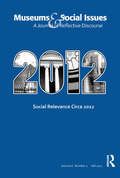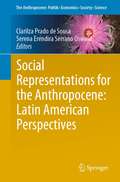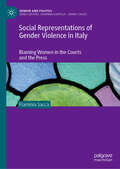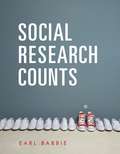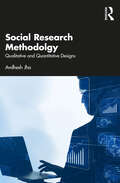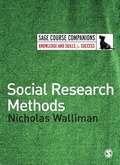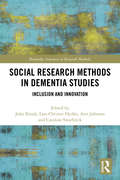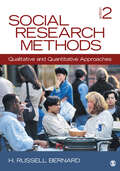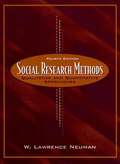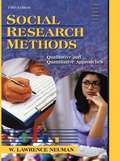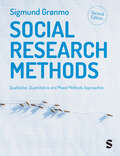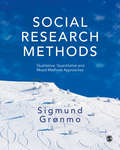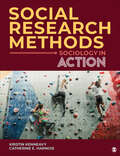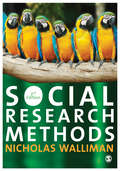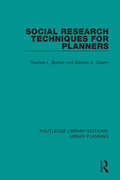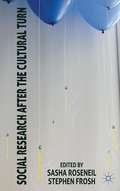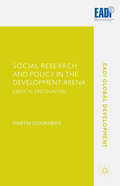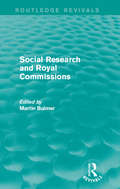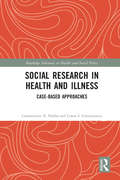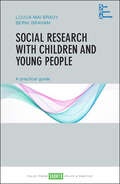- Table View
- List View
Social Relevance Circa 2012: Museums & Social Issues 6:2 Thematic Issue (Museums & Social Issues)
by Kris Morrissey Elee WoodFirst Published in 2011. Routledge is an imprint of Taylor & Francis, an Informa company.
Social Representations for the Anthropocene: Latin American Perspectives (The Anthropocene: Politik—Economics—Society—Science #32)
by Serena Eréndira Serrano Oswald Clarilza Prado de SousaThe Anthropocene has become a field of studies in which the influence of human activity on the Earth System and nature is both the main threat and the potential solution. Social Representations Theory has been evolving since the 1960s.It links knowledge and practice in everyday life and is an effective way to deal with systemic crises based on common sense. This book assembles key contributions by Latin American scholars working with social representations in the social sciences that are of conceptual relevance to the study of the Anthropocene and that investigate the societal consequences of complex interrelations between common sense and topics of global relevance, such asthe contradictions of sustainable development, the construction of risks beyond risk-perception, health, negotiation and governance in the field of education, gender equality, the usefulness of longitudinal and systemic ethnography and case studies, and agency and the link between inequality, crises and risk society in the context of COVID-19, presenting theoretical and methodological innovations fromSpanish, Portuguese and Frenchresearchthat have rarely been available in English. • This is the first book to address the relevance of Social Representations Theory for the Anthropocene as a societal era• It presents the multidisciplinary scope of Social Representations• This book covers emerging research contributions in Social Representations Theory from Latin America• This book presents innovative research and commentaries by established researchers in the field• This multidisciplinary book should be in the libraries of many disciplines in the social sciences and humanities
Social Representations of Gender Violence in Italy: Blaming Women in the Courts and the Press (Gender and Politics)
by Flaminia SaccàThis volume illustrates and analyses the stereotypes and prejudices underlying the social representation of violence against women as it is narrated and described in Italy by the press and by court judgements. After a theoretical reflection on the role of culture and socialisation in reproducing the conditions underlying gender-based violence and its normalisation, and after reconstructing the historical evolution of gender roles and the stages of women’s condition, the book presents the results of a sociological and of a socio-linguistic analysis on a vast corpus of 16,715 newspaper articles published by fifteen Italian newspapers on gender crimes (specifically: femicide; sexual violence; domestic violence; women trafficking) . The chapters analyze how national, macro-regional and local Italian press narrates violence against women but they also analyze a repertoire of 283 judicial sentences. The results show a clear tendency to redistribute the responsibilities of these crimes between the perpetrator and the victim, leading not only to secondary victimization but also to tertiary victimization, affecting the quality of Italian institutions as well as the democratic fiber of the nation. The volume finally includes a compendium of the best and the worst practices found in the corpuses of sentences and newspapers’ articles and a set of recommendations addressed to the institutional actors and journalists for a correct representation of gender-based violence, free from those stereotypes and prejudices that violate the dignity of male violence’ victims and prevent them from accessing justice.
Social Research Counts
by Earl BabbieBecome a competent, confident, and critical consumer of social research with Earl Babbie's SOCIAL RESEARCH COUNTS. Written with wit, and with a desire to see you succeed in the course, the book presents the main tenets of research methods concisely and in a visually appealing, full-color format that engages you in the topics and helps you make the connection between a concept and its real-world applications. Each chapter includes features designed to guide you through the material, including Learning Objectives that offer you an easy-to-follow guide to the content, as well as "Tips and Tools" and "Research in Real Life" boxes that provide opportunities for you to better equip yourself with relevant skills. As a result of using this book, you will gain a firm footing in the foundational skills and principles of research methods.
Social Research Methodology: Qualitative and Quantitative Designs
by Avdhesh JhaThis book provides unrivalled coverage of both quantitative and qualitative research methods, making it invaluable for anyone embarking on social research. Divided into five parts/sections, it introduces tools, techniques, critical aspects and knowledge of conducting social research, which include a detailed discussion about the basics of social research, social research problem, review of literature, hypothesis, sampling, research design, tools of research, statistics and report writing. The volume helps acquire knowledge, develop an understanding, apply the concepts in social research and curate checklists and rating scales designed to evaluate the statement of a problem, research proposal, hypothesis, different methods of research and writing research reports. It also includes a brief discussion about statistics, the style of reporting and the criteria for evaluating social research. This book will be a helpful reference/text for graduates, postgraduates, doctoral scholars and all those interested in societal development. It would also be useful to students, researchers and teachers of the various social sciences disciplines like psychology, sociology, education, social work and other allied subjects. It would be an invaluable companion to professionals and data scientists working in the field of analytics.
Social Research Methods
by Dr Nicholas WallimanSAGE Course Companions are an exciting new series from SAGE offering students an insider's guide into how to make the most of their undergraduate courses and extend their understanding of key concepts covered in their course. Social Research Methods provides student readers with essential help with their research project, with revising for their course exams, preparing and writing course assessment materials, and enhancing and progressing their knowledge and thinking skills in line with course requirements on Research Methods courses. This Course Companion is designed to augment, rather than replace, existing textbooks for the course, and will provide: " Helpful summaries of the course curriculum to aid essay and project planning " Key summaries of the approach taken by the main Methods textbooks " Guidance on the essential study skills required " Help with developing critical thinking " Route-maps to aid the development of wider learning above and beyond the textbook " Pointers to success in course exams and written assessment exercises " A tutor's-eye view of what course examiners are looking for " An insider's view of what key course concepts are really all about SAGE Course Companions are much more than revision guides for undergraduate; they are an essential tool to taking your course learning and understanding to new levels and in new directions that are the key to success in undergraduate courses.
Social Research Methods in Dementia Studies: Inclusion and Innovation (Routledge Advances in Research Methods)
by Ann Johnson John Keady Lars-Christer Hydén Caroline SwarbrickTraditionally, the most preferred social research methods in dementia studies have been interviews, focus groups and non-participant observations. Most of these methods have been used for a long time by researchers in other social research fields, but their application to the field of dementia studies is a relatively new phenomenon. A ground-breaking book, Social Research Methods in Dementia Studies shows researchers how to adapt their methods of data collection to address the individual needs of someone who is living with dementia. With an editorial team that includes Ann Johnson, a trained nurse and person living with dementia, this enlightening volume mainly draws its contents from two interdisciplinary social research teams in dementia, namely the Center for Dementia Research [CEDER] at Linköping University in Norrköping, Sweden and the Dementia and Ageing Research Team [DART] at The University of Manchester in Manchester, UK. Case examples are shared in each of the main chapters to help ground the social research method(s) in a real-life context and provide direction as to how learning can be applied to other settings. Chapters also contain key references and recommended reading. This volume will appeal to undergraduate and postgraduate students, as well as postdoctoral researchers, interested in fields such as: Research Methods, Qualitative Methods and Dementia Studies.
Social Research Methods: Qualitative and Quantitative Approaches
by H. Russell BernardThis text provides a comprehensive guide to doing research in the social and behavioral sciences—from research design and sampling to collecting and analyzing data. Rich in examples, the book has been revised and updated to provide today′s students with a conceptual understanding of each qualitative and quantitative technique, as well as showing them how to use it."The main strength of this text is coverage of both quantitative and qualitative methodology from a broad range of fields. The examples are often my students′ favorite thing to discuss in class." -Erica B. Gibson, University of South Carolina"Bernard does an excellent job of not only showing how to practice research but also provides a detailed discussion of broader historical and philosophical contexts that are important for understanding research." -Julian Kilker, University of Nevada, Las Vegas"The depth of detailed descriptions (foundations of social research; interviewing, participant observation, field notes, and data analysis) go beyond other texts…the organization is superb." -Benedict J. Colombi, University of Arizona
Social Research Methods: Qualitative and Quantitative Approaches (4th edition)
by W. Lawrence NeumanThis book offers students balanced coverage of both the qualitative and quantitative approaches to social research. It teaches them to guard against ethnocentric perspectives and confining their research on the assumptions of their own society.
Social Research Methods: Qualitative and Quantitative Approaches (5th edition)
by W. Lawrence Neumanresearch methods textbook for the social sciences
Social Research Methods: Qualitative, Quantitative and Mixed Methods Approaches
by Sigmund GronmoFraming research as the process of asking and answering questions, this book demonstrates how to identify good research questions and how to structure and explore them successfully. Whether you are just beginning your research journey or are a seasoned traveller, it helps you: • Decide what you want to achieve with your research • Know what options you have to explore your goals • Navigate the nuances of different research approaches • Understand the decisions of other researchers • Choose what path best suits your project. Through real-life examples demonstrating different types of research, the book introduces qualitative, quantitative, and mixed methods approaches so you can compare different methods at every stage of the research process, from initial idea and design to data collection and analysis. This new edition includes new chapters on collecting and analysing mixed methods data, and additional content on qualitative data analysis. New examples reflect the cultural and global diversity of social research, and extra visual aids and summaries support understanding of key research concepts and stages. The book is accompanied by an online teaching guide, including videos, additional case studies, annotated articles, and critical thinking exercises.
Social Research Methods: Qualitative, Quantitative and Mixed Methods Approaches
by Sigmund GronmoFraming research as the process of asking and answering questions, this book demonstrates how to identify good research questions and how to structure and explore them successfully. Whether you are just beginning your research journey or are a seasoned traveller, it helps you: • Decide what you want to achieve with your research • Know what options you have to explore your goals • Navigate the nuances of different research approaches • Understand the decisions of other researchers • Choose what path best suits your project. Through real-life examples demonstrating different types of research, the book introduces qualitative, quantitative, and mixed methods approaches so you can compare different methods at every stage of the research process, from initial idea and design to data collection and analysis. This new edition includes new chapters on collecting and analysing mixed methods data, and additional content on qualitative data analysis. New examples reflect the cultural and global diversity of social research, and extra visual aids and summaries support understanding of key research concepts and stages. The book is accompanied by an online teaching guide, including videos, additional case studies, annotated articles, and critical thinking exercises.
Social Research Methods: Qualitative, Quantitative and Mixed Methods Approaches
by Sigmund GrønmoStructured around one of the concepts students struggle with the most—the research question—this book begins with how to understand the role of good questions before demonstrating how questions underpin good research designs and how social research can be framed as asking and answering questions. Perfect for undergraduate students new to methods, it teaches students how qualitative, quantitative, and mixed methods research can be used to answer these questions. "An incredibly resourceful book that contains a forensic insight into social research methods, offering the full range of contemporary approaches. Students will find particular value in the accessibility and detail of the text. Each chapter provides a set of learning outcomes, study questions and further reading." - Dr Ruth McAreavey, Newcastle University Supported by a website that maps online resources to key stages of the learning process, it helps students: - Understand the scientific method - Learn the vocabulary of social science research - Plan and design research - Practice with and interpret data - Explore social science literature and improve assignments with good citations - Improve critical thinking. - Extensive visualizations, overviews, examples, exercises, and other learning features, make this the perfect introductory text to build confidence and best practice around research methods.
Social Research Methods: Qualitative, Quantitative and Mixed Methods Approaches
by Sigmund GrønmoStructured around one of the concepts students struggle with the most—the research question—this book begins with how to understand the role of good questions before demonstrating how questions underpin good research designs and how social research can be framed as asking and answering questions. Perfect for undergraduate students new to methods, it teaches students how qualitative, quantitative, and mixed methods research can be used to answer these questions. "An incredibly resourceful book that contains a forensic insight into social research methods, offering the full range of contemporary approaches. Students will find particular value in the accessibility and detail of the text. Each chapter provides a set of learning outcomes, study questions and further reading." - Dr Ruth McAreavey, Newcastle University Supported by a website that maps online resources to key stages of the learning process, it helps students: - Understand the scientific method - Learn the vocabulary of social science research - Plan and design research - Practice with and interpret data - Explore social science literature and improve assignments with good citations - Improve critical thinking. - Extensive visualizations, overviews, examples, exercises, and other learning features, make this the perfect introductory text to build confidence and best practice around research methods.
Social Research Methods: Sociology in Action
by Kathleen Odell Korgen Catherine E. Harnois Maxine P. Atkinson Kristin Marie KenneavyFeaturing a unique pedagogical framework, Social Research Methods: Sociology in Action provides all the elements required to create an active learning experience for this course. Modeled after the other volumes in SAGE′s "Sociology in Action" series, this innovative new text combines hands-on work, application, and learning-by-example. It features a diverse group of expert contributing authors who also practice active learning in their own classrooms. Each chapter discusses one aspect of conducting quantitative or qualitative research and pairs that foundational coverage with carefully-developed learning activities and thought-provoking questions that prompt students to practice and apply their new research skills. The comprehensive Activity Guide that accompanies the text will help you carry out and assess the activities that best engage your students, fit the mode of instruction you choose, and meet your course goals. In the spirit of the "Sociology in Action" theme, the text concludes with two unique chapters on how social researchers interact with their surrounding communities and help bring about social change and social justice. This title is accompanied by a complete teaching and learning package. Contact your SAGE representative to request a demo. Digital Option / Courseware SAGE Vantage is an intuitive digital platform that delivers this text’s content and course materials in a learning experience that offers auto-graded assignments and interactive multimedia tools, all carefully designed to ignite student engagement and drive critical thinking. Built with you and your students in mind, it offers simple course set-up and enables students to better prepare for class. Learn more. Assignable Video with Assessment Assignable video (available with SAGE Vantage) is tied to learning objectives and curated exclusively for this text to bring concepts to life. Watch a sample video now. LMS Cartridge: Import this title’s instructor resources into your school’s learning management system (LMS) and save time. Don’t use an LMS? You can still access all of the same online resources for this title via the password-protected Instructor Resource Site. Learn more.
Social Research Methods: Sociology in Action
by Kathleen Odell Korgen Catherine E. Harnois Maxine P. Atkinson Kristin Marie KenneavyFeaturing a unique pedagogical framework, Social Research Methods: Sociology in Action provides all the elements required to create an active learning experience for this course. Modeled after the other volumes in SAGE′s "Sociology in Action" series, this innovative new text combines hands-on work, application, and learning-by-example. It features a diverse group of expert contributing authors who also practice active learning in their own classrooms. Each chapter discusses one aspect of conducting quantitative or qualitative research and pairs that foundational coverage with carefully-developed learning activities and thought-provoking questions that prompt students to practice and apply their new research skills. The comprehensive Activity Guide that accompanies the text will help you carry out and assess the activities that best engage your students, fit the mode of instruction you choose, and meet your course goals. In the spirit of the "Sociology in Action" theme, the text concludes with two unique chapters on how social researchers interact with their surrounding communities and help bring about social change and social justice. This title is accompanied by a complete teaching and learning package. Contact your SAGE representative to request a demo. Digital Option / Courseware SAGE Vantage is an intuitive digital platform that delivers this text’s content and course materials in a learning experience that offers auto-graded assignments and interactive multimedia tools, all carefully designed to ignite student engagement and drive critical thinking. Built with you and your students in mind, it offers simple course set-up and enables students to better prepare for class. Learn more. Assignable Video with Assessment Assignable video (available with SAGE Vantage) is tied to learning objectives and curated exclusively for this text to bring concepts to life. Watch a sample video now. LMS Cartridge: Import this title’s instructor resources into your school’s learning management system (LMS) and save time. Don’t use an LMS? You can still access all of the same online resources for this title via the password-protected Instructor Resource Site. Learn more.
Social Research Methods: The Essentials
by Nicholas WallimanNicholas Walliman is the supervisor in your students' pockets, making sure they understand all the essential methods for successfully carrying out a research project and negotiating the challenges and pitfalls. In this book, he: · Takes students step-by-step through the research process · Helps them formulate clear aims and objectives · Explains all the vocabulary to understand the A - Z of research methods · Ends each chapter with a reading guide for taking learning further with more resources to help get a deeper understanding of the issues discussed · Improves research reports with practical advice on presenting findings in great tables, graphs and diagrams · Opens his office door with reflective questions (and answers) · Delivers the confidence to get started and get finished! Social Research Methods: The Essentials is the perfect starting point and guide for your students' research project.
Social Research Methods: The Essentials
by Nicholas WallimanNicholas Walliman is the supervisor in your students' pockets, making sure they understand all the essential methods for successfully carrying out a research project and negotiating the challenges and pitfalls. In this book, he: · Takes students step-by-step through the research process · Helps them formulate clear aims and objectives · Explains all the vocabulary to understand the A – Z of research methods · Ends each chapter with a reading guide for taking learning further with more resources to help get a deeper understanding of the issues discussed · Improves research reports with practical advice on presenting findings in great tables, graphs and diagrams · Opens his office door with reflective questions (and answers) · Delivers the confidence to get started and get finished! Social Research Methods: The Essentials is the perfect starting point and guide for your students' research project.
Social Research Techniques for Planners (Routledge Library Editions: Urban Planning #5)
by Gordon E. Cherry Thomas L. BurtonOriginally published in 1970 Social Planning Techniques for Town Planners introduces social research methods for town planners. The book places an emphasis on social research within the planning process, and addresses the problem faced by the research worker at successive stages of a research project. It outlines the major conceptual and organizational problems likely to be encountered in any social research for planning, and provides guidelines for tackling these. The book’s focus is on social science research methods and the application of social and economic research to issues of urban and regional planning and administration.
Social Research after the Cultural Turn
by Stephen Frosh Sasha RoseneilThis collection explores the contested meanings and diverse practices of social research in the context of contemporary theoretical debates in cultural and social theory, addressing fundamental questions facing those working in the social and human sciences today.
Social Research and Policy in the Development Arena: Critical Encounters (EADI Global Development Series)
by Martin DoornbosThe author focuses on the research-policy nexus in development studies, highlighting reciprocal orientations and interactions between the domains of social research and of policy and politics. He looks at instances where these domains are complementary and geared towards common objectives, but also with others marked by opposing rationales.
Social Research and Reflexivity
by Beth Perry Tim MayWhat are the critical gaps in thinking about reflexivity and social research? How is reflexive practice shaped by the contexts and cultures in which researchers work? How might research practice respond to twin demands of excellence and relevance in the knowledge-based economy? Thinking reflexively about the inter-relationships between social research and societal practices is all the more important in the so-called knowledge economy. Developing reflexive practices in social research is not achieved through applying a method. Where and how researchers work is fundamental in shaping the capacities and capabilities to produce research as content and context lie in a dynamic interaction. This book not only provides a history of reflexive thought, but its consequences for the practice of social research and an understanding of the contexts in which it is produced. It provides critical insights into the implications of reflexivity through a discussion of positioning, belonging and degrees of epistemic permeability in disciplines. It is also highly innovative in its suggestions for ways forward in research practice through the introduction of active intermediaries. Overall, the book offers an exciting new position on reflexive research that will generate much debate through its successful achievement of two difficult feats: providing essential reading for orientations on reflexivity and social research in the twenty-first century and making a landmark contribution to thinking and practice in the field. Social Research and Reflexivity is suitable for advanced undergraduates, postgraduates and social researchers in general across a number of disciplines including geography, social research, management and organizations; economics, urban studies, sociology, social policy, anthropology and politics, as well as science and technology studies.
Social Research and Royal Commissions (Routledge Revivals)
by Martin BulmerSocial scientists have proposed several different models for the relationship between social science theory, empirical social research and the actual making of public social policy. This book, first published in 1980, seeks to provide a critical analysis of the impact of research on policy through the detailed examination of the part which research played in the work of Royal Commissions of Inquiry, the bodies set up by government to consider, gather evidence on, report and make recommendations about specific policy areas. This titles varied and stimulating chapters will serve to shed considerable light, not all of it positive, upon the potential contribution of the social sciences to the practice of government. This book will be of interest to students of the social sciences, particularly sociology and politics.
Social Research in Health and Illness: Case-Based Approaches
by Costas S. Constantinou Constantinos N. PhellasSocial Research in Health and Illness offers a theoretically informed guide to practising the key social research methods in investigating health and illness. Examining both methods and methodology, the authors explore the importance of selecting the appropriate research method for the project in question, demonstrating that researchers do not simply apply a set of neutral techniques to the issues that they investigate, but take part in a dynamic, reflective engagement with social and cultural worlds in a process of continual learning. With its application of a variety of research methods to concrete cases, this book provides a sociology of specific health conditions, thus rendering them more understandable, whilst clarifying the nature of research concepts, approaches, methods and methodologies by demonstrating their use in real-life settings. Drawing on case studies involving a range of health conditions, including mental illness, HIV, diabetes, kidney disease, Alzheimer’s disease, heart disease, breast cancer, thalassaemia and multiple sclerosis, the authors examine a range of methodological issues, exploring the use of focus groups, observation, data archives, interviews and surveys, while also considering questions of ethics and analysis. A comprehensive and practical examination of research methods in use in a defined field of social scientific enquiry, this volume is essential reading for scholars, graduate students and healthcare professionals with interests in conducting qualitative and quantitative research in the fields of health and medicine.
Social Research with Children and Young People: A Practical Guide (Social Research Association Shorts)
by Louca-Mai Brady Berni GrahamCapturing the views and experiences of children and young people directly and involving them more actively in the research process are increasingly seen as essential for good research, evaluation, and policy and service development. Written by two experienced social researchers and trainers, this book provides a practical and concise introductory guide to doing research with children and young people, outlining the benefits and challenges along with key ethical, methodological and other considerations. Throughout, there are practical examples, checklists and top tips to aid the reader. Building on an established SRA training course, it offers an instructive resource for researchers, commissioners, policy makers, research users and others involved in research with children or young people.
